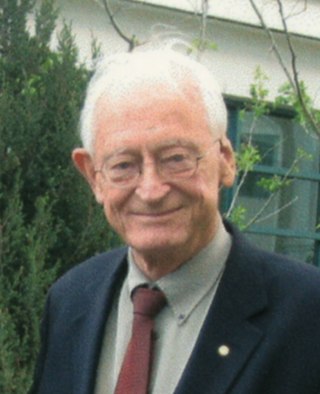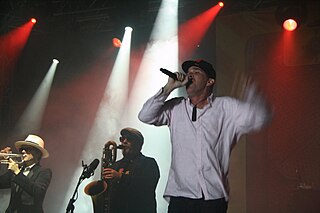New Zealand Naval Forces was the name given to a division of the Royal Navy. The division was formed in 1913 and it operated under this name until 1921, when it became the New Zealand Division of the Royal Navy.

Howick is a suburb of East Auckland, New Zealand. The area was traditionally settled by Ngāi Tai ki Tāmaki, and in 1847 Howick was established as a defensive settlement for Auckland, by veteran fencible soldiers of the British Army. Howick was a small agricultural centre until the 1950s, when it developed into a suburban area of Auckland.

Alan Hugh Dale is a New Zealand actor, known for his early long-running role as Jim Robinson in Australian tv soap opera Neighbours, American series' The O.C. and Ugly Betty, as well as recurring and guest roles in Lost, 24, NCIS, ER, The West Wing, The X-Files, Entourage, Once Upon a Time and Dynasty as Joseph Anders.

Alan Graham MacDiarmid, ONZ FRS was a New Zealand-born American chemist, and one of three recipients of the Nobel Prize for Chemistry in 2000.

Urban Pasifika is a New Zealand subgenre of hip hop, that developed primarily among Pasifika New Zealanders in South Auckland. Drawn from alternative hip hop and R&B influences, it was quickly blended with Pacific Island or Māori instrumentation and traditional songwriting and singing and rapping in a variety of Polynesian languages, such as Māori, Samoan, Niuean and Tongan. The genre's genesis in the 1980s blossomed into a unique, globally enrapturing cultural scene in its homeland of Auckland, especially in the next decade. Urban Pasifika is one of the most popular music genres to arise from New Zealand, and helped cement Auckland's reputation on the world stage as a major cultural centre, and the most ethnically Polynesian city in the world.
Alan Joseph Patterson is a former field hockey player from New Zealand, who represented his native country at three Summer Olympics: in 1960, 1964 and 1972.
Alan or Allan Smith may refer to:
Alan Blair Thompson is a sprint canoeist who competed in the early to mid-1980s. He competed at three Olympic Games (1980–1988) and won two Olympic gold medals for New Zealand.
Māori or Maori can refer to:
The Australian cricket team toured New Zealand in the 1976–77 season to play a two-match Test series against New Zealand. Australia won the series 1–0.
Alan Chan Yun Lung is a male badminton player from New Zealand who specializes in doubles. In 2008 he started representing Hong Kong, then in 2017 he returned to representing New Zealand.
Alan Smith is a New Zealand sailor who has sailed at the Summer Olympics and in eight America's Cups.
The 2005 New Year Honours in New Zealand were appointments by Elizabeth II in her right as Queen of New Zealand, on the advice of the New Zealand government, to various orders and honours to reward and highlight good works by New Zealanders, and to celebrate the passing of 2004 and the beginning of 2005. They were announced on 31 December 2004, and included gallantry awards for actions in East Timor.
The 2010 Queen's Birthday Honours in New Zealand, celebrating the official birthday of Queen Elizabeth II, were appointments made by the Queen in her right as Queen of New Zealand, on the advice of the New Zealand government, to various orders and honours to reward and highlight good works by New Zealanders. They were announced on 7 June 2010.
The 1962 New Year Honours in New Zealand were appointments by Elizabeth II on the advice of the New Zealand government to various orders and honours, rewarding and highlighting good works by New Zealanders. The awards celebrated the passing of 1961 and the beginning of 1962, and were announced on 1 January 1962.
The 1996 New Year Honours in New Zealand were appointments by Elizabeth II in her right as Queen of New Zealand, on the advice of the New Zealand government, to various orders and honours to reward and highlight good works by New Zealanders, and to celebrate the passing of 1995 and the beginning of 1996. They were announced on 30 December 1995.
The 1982 Queen's Birthday Honours in New Zealand, celebrating the official birthday of Elizabeth II, were appointments made by the Queen in her right as Queen of New Zealand, on the advice of the New Zealand government, to various orders and honours to reward and highlight good works by New Zealanders. They were announced on 12 June 1982.
The 1981 Queen's Birthday Honours in New Zealand, celebrating the official birthday of Elizabeth II, were appointments made by the Queen in her right as Queen of New Zealand, on the advice of the New Zealand government, to various orders and honours to reward and highlight good works by New Zealanders. They were announced on 13 June 1981.
The 1923 King's Birthday Honours in New Zealand, celebrating the official birthday of King George V, were appointments made by the King on the recommendation of the New Zealand government to various orders and honours to reward and highlight good works by New Zealanders. They were announced on 2 June 1923.
The 1943 New Year Honours in New Zealand were appointments by King George VI to various orders and honours in recognition of war service by New Zealanders. The awards celebrated the passing of 1942 and the beginning of 1943, and were announced on 1 January 1943. No civilian awards were made.



